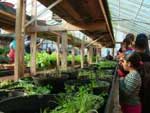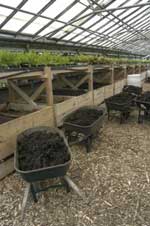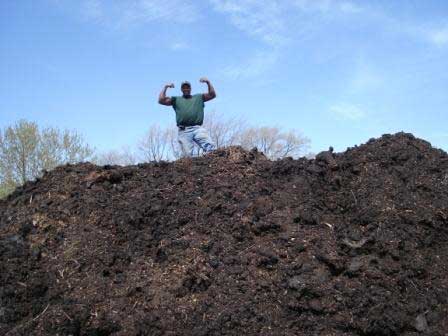 |
 |
 |
Today I want to write about an extraordinary farming project which has been an inspiration for me for about the last 7 or 8 years, Will Allen and the Growing Power project in Milwaukee. They have some things in common with the New Alchemy Institute but many very different aspects. Like the New Alchemists they are demonstrating that it is possible to grow a huge variety of food in cold climates in ways that are profoundly ecologically sustainable and restorative by making intelligent use of greenhouses and polytunnels. They use all possible vertical zones, with fish tanks extending five feet underground to baskets of salad crops suspended from the greenhouse roofs. The fish tanks also add thermal mass to stabilize temperatures and the fish help recycle nutrients. Composting and vermicomposting, or worm farming, is another vital element in the mix.

Will Allen and the Growing Power team have achieved something extraordinary in terms of social justice and social inclusion. Whereas the New Alchemy Institute was essentially an academic research project aimed at demonstrating the possibility of ecologically sustainable systems the Growing Power project has at its core the poor urban inner-city community in Milwaukee. Will Allen, a 6ft 7in, black, ex basket ball player turned urban farmer, teamed up with the Growing Power, an organisation working with inner-city teenagers, and from 1993 they started having a dramatic effect on the city of Milwaukee. Their goal is to “grow food, to grow minds and to grow community.” This is mass participation food production, with thousands of volunteers and visitors helping grow food and work together to improve the diets and prospects of people in the inner-city.
Growing Power headquarters is a two acre farm which employs about 36 people. This is not farming as we know it: they run courses, do community outreach, help a network of farmers market their produce, run a shop and far too much else to mention, and they do grow a lot of food sustainably in a cold climate! They have been a beacon of hope for me, and the four links below are well worth looking at if you are looking for evidence that food systems can be much more ecologically sustainable and socially inclusive.
See their website http://www.growingpower.org/index.htm
And see this video clip of Will Allen http://www.growingpower.org/in_the_news.htm
This week they have just agreed a partnership with the City of Milwaukee to create 150 more full-time urban farming jobs. http://www.growingpower.org/assets/invitation_150jobs%204.7.11.pdf
Will Allen, Good Food Manifesto for America. http://growingpower.wordpress.com/2009/05/09/manifesto/

